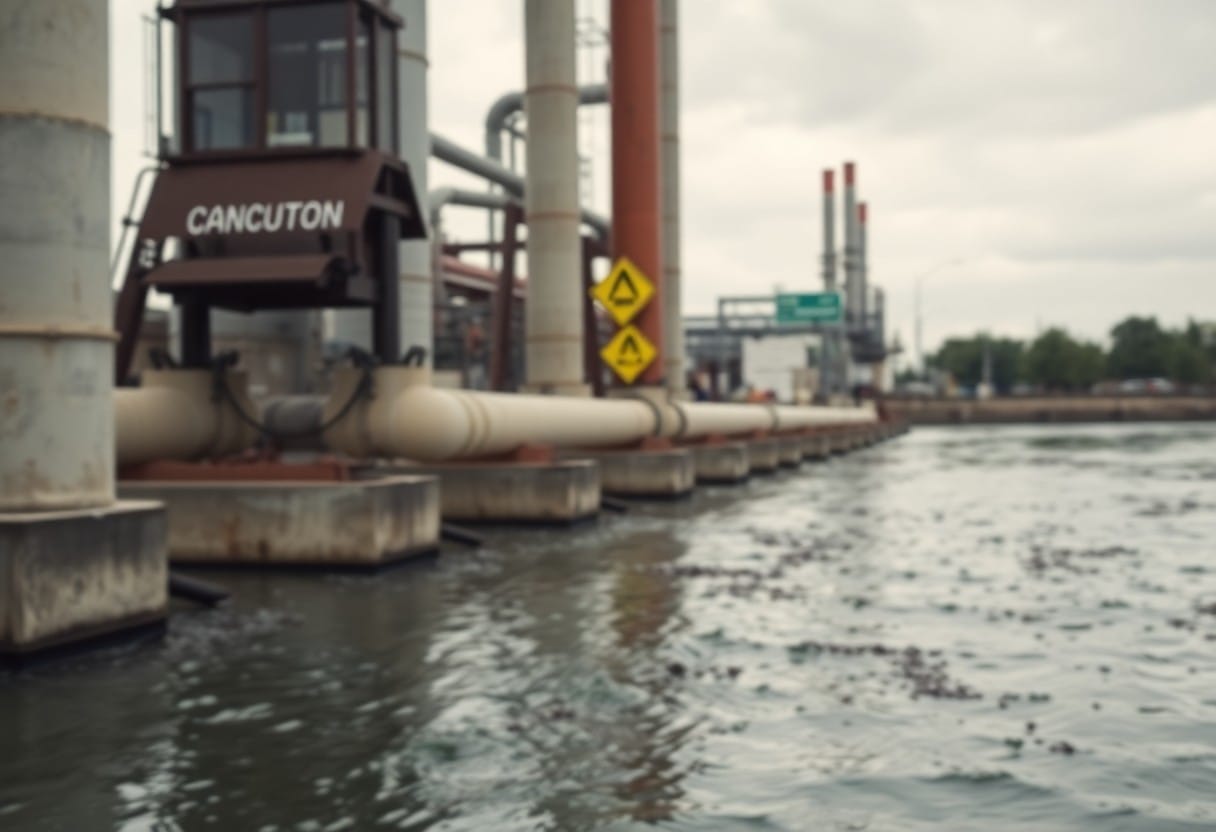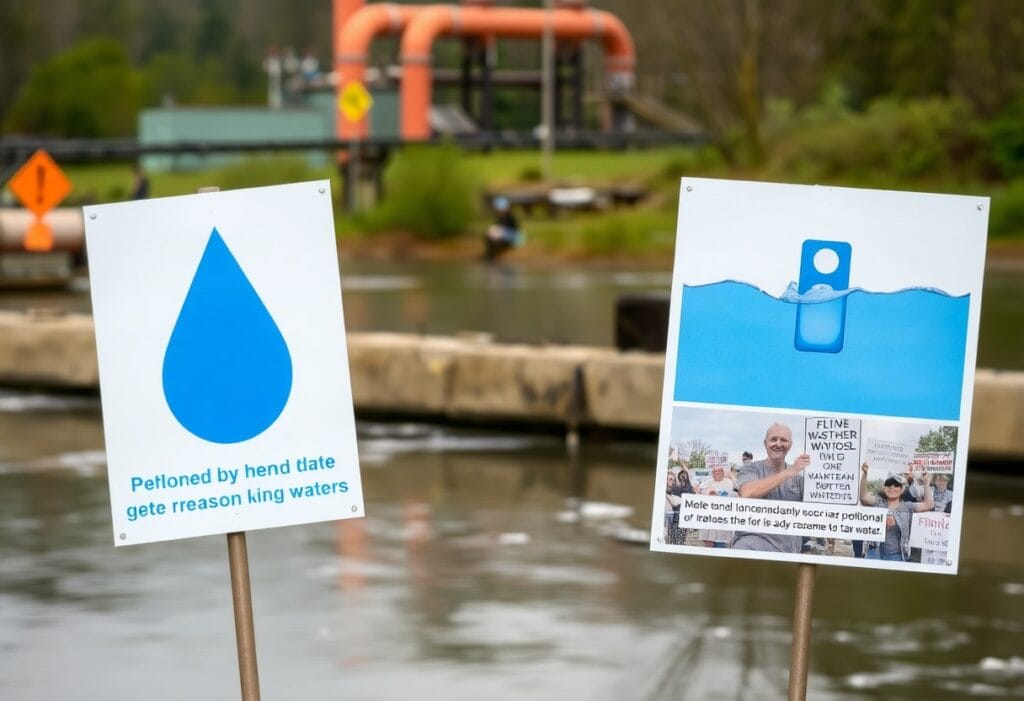Fayetteville has faced its own water crisis with the Chemours chemical spill, a situation that echoes other significant national water scandals. In this post, you will explore the similarities and differences between Fayetteville’s experiences and broader incidents across the country that have impacted communities. Understanding the chemical contamination issue can help you grasp the wider implications for public health and environmental safety. By examining these parallels, you can become more informed about the factors influencing your water quality and the ongoing efforts to safeguard it.
Understanding the Chemours Crisis
Before delving into the specifics of the Chemours crisis in Fayetteville, it’s imperative to understand the broader implications of water contamination issues that often arise in communities across the nation. Water sources are the lifeblood of any community, and when they become tainted with hazardous substances, the consequences can be devastating. In Fayetteville, the exposure to polluted drinking water has raised serious concerns among residents and officials alike about the health risks and environmental impact stemming from industrial activities.
Overview of Fayetteville’s Contamination
To gain a clearer perspective on Fayetteville’s contamination issue, you need to consider the events that led to the discovery of toxic substances in the local water supply. The Chemours Company, a chemical manufacturer, has been linked to the release of harmful pollutants into the Cape Fear River, which serves as a primary source of drinking water for residents. This situation escalated as studies revealed that levels of these substances exceeded safety thresholds, leading to heightened anxiety among the population and prompting calls for immediate action from both local and state authorities.
Key Chemicals and Their Impact
With a comprehensive understanding of the situation, it’s vital to examine the specific chemicals responsible for the contamination and their effects on human health. Per- and polyfluoroalkyl substances (PFAS), often referred to as “forever chemicals,” have gained notoriety for their persistence in the environment and potential health risks. Research has associated PFAS exposure with various health issues, including adverse effects on the immune system and increased risks of certain types of cancer, creating alarm within the Fayetteville community.
Impact studies indicate that the *long-term exposure* to these hazardous chemicals can lead to *serious health complications* for you, such as *reduced kidney function* and *disruption of hormonal systems*. Furthermore, the psychological impact on residents who fear for their health and the safety of their children cannot be overlooked. Communities like yours are facing challenges not only from the tangible consequences of water contamination but also from the intangible stress and anxiety about the unknown long-term impacts on public health. As you consider these potential outcomes, it’s imperative to stay informed about the ongoing developments and regulations surrounding water safety in your area.
Historical Context of Water Scandals
You may not realize that the history of water scandals in the United States is marked by a series of alarming events that have significantly impacted public health. From lead contamination in Flint, Michigan, to the toxic waste seepage in Wilmington, North Carolina, water crises have often been linked to negligence in regulatory practices and corporate accountability. As seen in the recent reports highlighting concerns surrounding Chemours, the potential dangers associated with industrial waste remain profound. You can read more about this ongoing issue in the piece discussing how concerns persist though EPA denies Chemours’ waste import requests and the implications for local communities.
Notable National Cases
With incidents like the Flint water crisis and the contamination discovered at Camp Lejeune, it’s clear that the challenges of safeguarding water supplies are a national concern. Flint’s crisis, triggered by lead pipes and poor management decisions, starkly highlighted the vulnerability of urban water systems, while Camp Lejeune’s decades-long exposure to toxic chemicals calls attention to the issues surrounding military and governmental accountability. The ripple effects of these events continue to resonate as communities seek justice and restorative measures.
Regulatory Framework and Failures
Above all, the regulatory frameworks intended to protect water quality in the U.S. have often fallen short, revealing serious lapses in oversight and enforcement. Agencies like the Environmental Protection Agency (EPA) have faced scrutiny over inadequate response times and failure to enforce existing regulations effectively. These failures expose the critical need for stronger regulatory measures and better resource allocation to prevent future disasters.
But understanding these regulatory failures is imperative for you as a concerned citizen. The challenges of political influence, alongside the shortcomings in environmental policy enforcement, have often resulted in devastating public health crises. You deserve transparency and accountability from those tasked with safeguarding your water supply. As you reflect on Fayetteville’s Chemours crisis, consider how these historical precedents shape your perspective on current and future water safety issues.

Community Response and Activism
Clearly, the fallout from the Chemours crisis in Fayetteville has ignited a wave of community response, underscoring the local population’s determination to advocate for their health and safety. Residents have come together, forming various grassroots organizations aimed at raising awareness and demanding accountability from both the Chemours Company and regulatory bodies. Town halls, community meetings, and social media campaigns have emerged, showcasing a robust network of concerned citizens dedicated to addressing the air and water pollution stemming from the facility. Your participation in these local initiatives can empower you and your neighbors, fostering a sense of solidarity in ensuring a cleaner environment for future generations.
Local Initiatives and Advocacy
Any effective local initiative starts with informed citizens. Fayetteville residents have organized numerous campaigns targeting local government representatives, urging them to implement stricter regulations and monitor the pollutants that are affecting their community. These endeavors often lead to petitions and calls for more transparency, pushing local leaders to confront the hard truths behind the industrial activities in your area. Your engagement in these initiatives can amplify the message, drawing attention to the urgent need for a community-wide response, while potentially inspiring other towns grappling with similar issues.
National Support and Solidarity
About the nationwide response to local water crises like that in Fayetteville, you should be aware that many communities nationwide are facing similar challenges, prompting a surge in national support and solidarity. Organizations dedicated to environmental justice, such as the Sierra Club and grassroots movements, have rallied behind the Fayetteville community, advocating for stricter environmental protections and offering legal assistance. This solidarity signifies a collective recognition that everyone deserves access to clean water and a safe environment, regardless of where they live. Your involvement in these larger movements can bolster your local efforts and connect you with individuals and organizations who share your concerns.
For instance, solidarity efforts include nationwide petitions demanding corporate accountability, educational webinars on the impacts of toxic substances, and funding initiatives to support local activists fighting against pollution. These national actions help amplify your voice as part of a larger movement, showing that Fayetteville is not alone in its struggles. Through collaboration, shared knowledge, and resource allocation, you can play a role in changing the landscape for your community, making it a safer place for your families. With widespread support, the fight against environmental hazards can take on a renewed vigor, demonstrating the power of unified community action on a national scale.
Legal Ramifications and Accountability
For many communities grappling with environmental disasters, legal ramifications can evolve into a complex web of lawsuits and settlements. In Fayetteville, the Chemours crisis has led to numerous lawsuits from residents seeking accountability for their exposure to harmful chemicals. These legal battles not only reflect a profound sense of community concern for public health but also influence how other affected regions handle similar situations. You should be aware that financial settlements resulting from these lawsuits can often provide compensation for medical expenses, property devaluation, and enduring psychological distress—elements that highlight the far-reaching impact of contamination on everyday lives.
Lawsuits and Settlements
The growing number of lawsuits is indicative of local residents’ insistence on accountability from Chemours. As these cases unfold, they shine a light on the necessity of corporate responsibility when it comes to environmental safety. Oftentimes, verdicts in such lawsuits can result in significant settlements, which not only serve the affected individuals but also prompt larger conversations about regulatory measures and future precautionary actions. You may find that these outcomes set precedents for other communities facing analogous scenarios, proving that the pursuit of justice can lead to systemic change.
Corporate Responsibility
Accountability in the corporate sector is largely about ownership of actions and their consequences. As the Chemours crisis illustrates, companies must prioritize their ethical obligations to both the community and the environment. It is important for you to acknowledge that corporate responsibility extends beyond simple compliance with regulations; it involves proactive measures to prevent harm, transparent communication regarding possible risks, and a commitment to remediating any damage caused. Companies that fall short in these areas often face not only legal repercussions but also significant damage to their reputations.
With the Chemours situation, the demand for corporate responsibility is not just a reaction to liability; it is also a call for transparency and sustainability practices in business operations. You should consider how addressing these responsibilities upfront can help foster trust with the community and mitigate adverse consequences that arise when public health is compromised. Ultimately, as you reflect on this crisis, the importance of holding corporations accountable today cannot be overstated; it is a vital step toward ensuring safer environments for future generations.
Public Health Implications
After the discovery of harmful chemicals leaching into Fayetteville’s water supply, the health implications for residents became a pressing concern. You may be aware that many communities across the nation have faced similar issues, leading to serious public health crises. As highlighted in The Drinking Water Crisis That North Carolina Ignored, the effects of contaminated water can have long-lasting impacts on the population’s well-being. Ensuring access to safe and clean drinking water is necessary for maintaining good health, and the fallout from such crises often includes increased rates of illness, as well as heightened anxiety among residents regarding their future health outcomes.
Health Studies and Findings
The available research on the health implications stemming from contaminated water supplies reveals alarming statistics. Studies indicate that long-term exposure to certain chemical compounds found in your drinking water can lead to various health issues, including cancers, liver damage, and developmental defects in children. Public health officials encourage you to stay informed about the water quality in your area, as understanding these risks can empower you to advocate for necessary changes and assessments to safeguard your health.
Long-term Environmental Risks
About the environmental consequences of Fayetteville’s water crisis, you should be aware that contaminants can linger in the ecosystem, posing threats beyond just human health. Pollutants such as PFAS (per- and polyfluoroalkyl substances) do not break down easily and can accumulate in the soil and wildlife, causing widespread ecological damage. Regulatory agencies are increasingly recognizing the need for stricter guidelines to manage the usage of such chemicals, but enforcement often lags behind the urgency of public concern.
Consequently, the long-term environmental risks associated with chemical contaminants in water sources can extend well into the future, affecting not only your water supply but also local ecosystems, wildlife populations, and food chains. The potential for bioaccumulation means that even if regulations change, the remnants of these substances may still pose serious threats. It is necessary for you to remain vigilant and informed, as the ongoing dialogue surrounding water safety impacts both your community and the surrounding environment.
Policy Recommendations
Unlike many other environmental crises, the Chemours situation in Fayetteville highlights the need for a robust and proactive approach to water safety regulations. Your first step in ensuring long-term solutions is to advocate for the implementation of stricter regulations surrounding chemical discharges in water sources. This means pushing for comprehensive monitoring programs that can detect contaminants at levels previously deemed undetectable. You should encourage local and state governments to take a hard stance on industries that risk public health and the surrounding ecosystem through less stringent practices.
Strengthening Regulations
Any reform in this area must include a reevaluation of existing laws governing water quality and chemical emissions. You should support efforts to develop standards that require companies to disclose all chemicals used in their processes, along with their potential impacts on public health and the environment. Furthermore, encouraging independent research on the long-term effects of these chemicals will help build a more informed public and create a system of accountability for corporations that improperly handle hazardous substances.
Enhancing Community Engagement
Beside the need for stronger regulations, it is equally important to focus on enhancing community engagement in discussions about water safety. You are encouraged to participate in local town halls, engage with local activists, and foster open dialogue with your community to ensure voices are heard, especially those who are most affected by contamination. By doing so, you are not just raising awareness, but you are also strengthening the collective stance of your community against potential threats to its water supply.
Strengthening community engagement means you should take the initiative to form or join local coalitions that aim to address water safety issues and advocate for the public’s right to clean water. Building partnerships with environmental organizations can amplify your efforts, bringing in additional resources and expertise. Utilizing social media platforms to share information, updates, and legislative changes can help cultivate a more active and informed citizenry dedicated to ensuring safe drinking water for generations to come.
Final Words
With these considerations, you can see that Fayetteville’s Chemours crisis is not just an isolated incident but part of a larger narrative of national water scandals. By comparing it to other well-documented cases, such as Flint, Michigan, or the contamination issues in Anniston, Alabama, you gain insight into the systemic problems affecting water quality across the United States. These scenarios underscore the vulnerabilities in regulatory frameworks, community guardianship, and the balance of industrial interests against public health. As you reflect on these comparisons, consider the implications for your community and the urgent need for transparency and accountability in industries that impact your water sources.
Your awareness of these issues is vital for fostering informed conversations about water quality in your area. By understanding the parallels between Fayetteville and national incidents, you can empower yourself and others to advocate for better environmental protections and to hold entities accountable. The dialogue around these issues can inspire actions that push for system-wide changes to ensure the safety of your drinking water and the health of your community. It is a shared responsibility to understand the broader implications of local incidents and to work collaboratively toward solutions that prioritize public welfare over corporate interests.


















